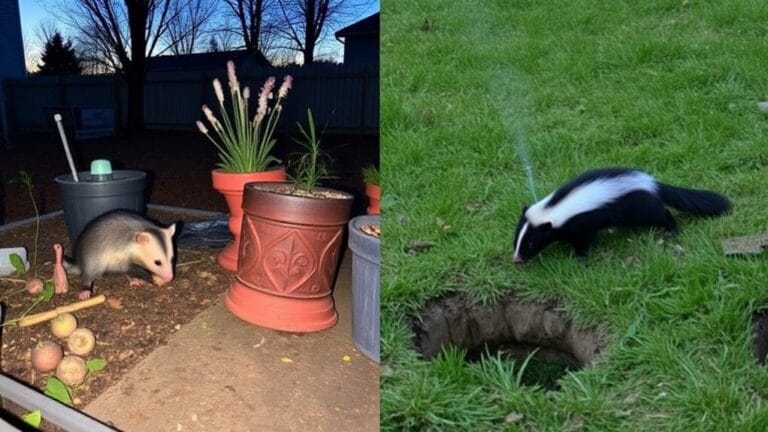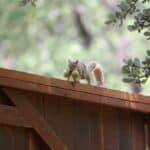Let me bust a myth: opossums aren't actually aggressive – they're total scaredy-cats who'd rather play dead than pick a fight. I know those hisses and bared teeth look scary, but that's just their way of saying "please leave me alone!" When you spot one, stay calm and back away slowly. These misunderstood creatures are actually helping you by eating thousands of ticks and other pests. They're naturally docile, have a super-low body temperature that makes them nearly rabies-proof, and would rather avoid you completely. There's a whole world of fascinating behaviors to discover about these peaceful nighttime wanderers.
Natural Behaviors and Defense Mechanisms
Table of Contents
Most opossums are actually quite docile creatures, despite their intimidating appearance and common misconceptions about their aggressive nature.
Natural pest controllers help maintain garden health by consuming insects, slugs, and small rodents. These peaceful creatures would rather play dead than pick a fight with you!
Here's what you need to know about their defense tactics:
- When threatened, they'll flop over and emit a smell so rank you'll wish you hadn't bothered them
- Those scary hisses? Just their way of saying "back off, please"
- They're nocturnal foragers who'd rather avoid you completely
Pro Tip: Their lower body temperature makes them terrible rabies carriers, so you can scratch that worry off your list
Look, these non-aggressive marsupials use vocalizations to scare you away because they're basically the introverts of the animal kingdom.
They'll only scratch or bite if you're being a real pain about personal space.
Reading Opossum Body Language
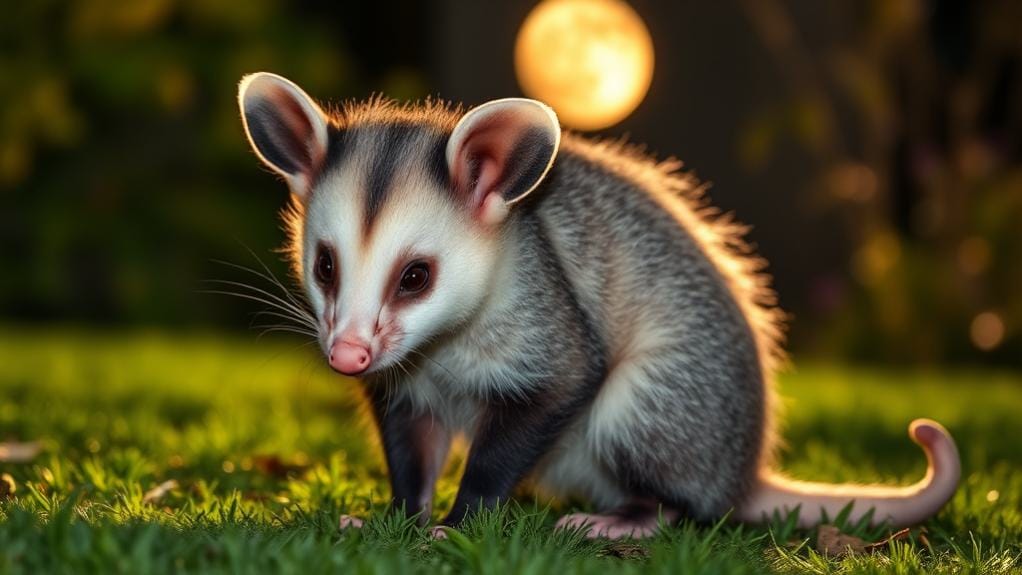
Three key signals help you decode an opossum's state of mind through their body language. Let me break it down for you – and trust me, you'll want to know this stuff before declaring war on that "aggressive" critter in your yard.
First up: defensive postures. When an opossum raises its fur and arches its back, it's basically saying "back off, buddy." Not exactly a dinner invitation, right?
Like other nocturnal marsupials, they rely heavily on body language to communicate since their eyesight isn't their strong suit. But here's where it gets interesting. A relaxed opossum keeps its body low and tail loose – that's your green light for calmness.
Pro tip: If you see teeth-baring and hissing, don't take it personally. They're just stressed, not plotting your demise.
When cornered, they'll either growl or pull their famous "playing dead" routine. Watch their tail position and ears – these subtle cues are your cheat sheet to their comfort level.
Signs of Non-Aggressive Interaction
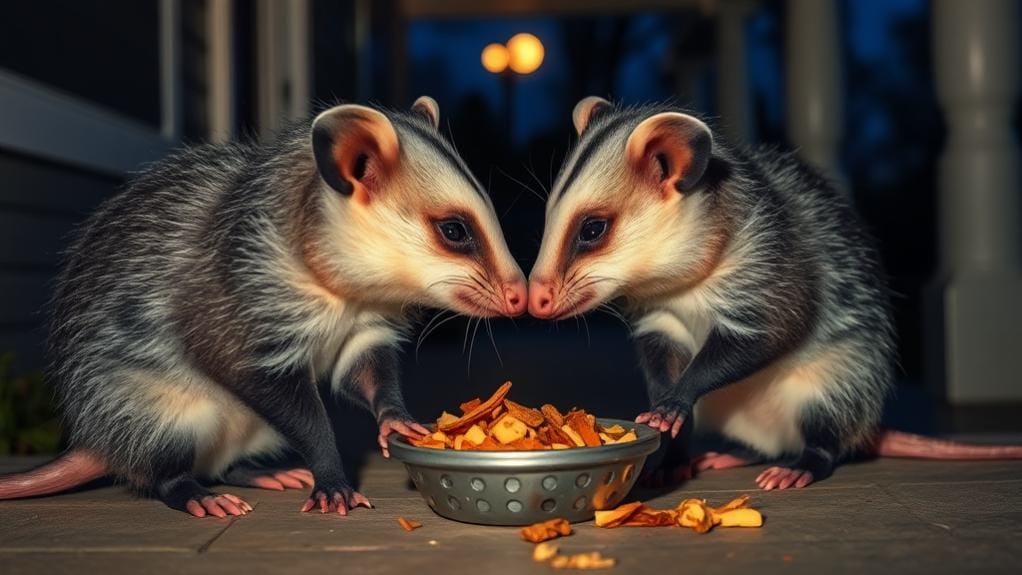
Despite their fierce reputation, opossums display clear signs when they're feeling calm and non-threatening. I'm here to bust the myth that these critters are out to get you! Their non-aggressive behavior is actually pretty easy to spot once you know what to look for.
| Behavior | Meaning | Your Response |
|---|---|---|
| Soft Clicking | Exploration | Stay calm, let them be |
| Playing Dead | Defense mechanism | Back away slowly |
| Gentle Chattering | Feeling secure | Maintain distance |
| Solitary Movement | Natural behavior | Give space |
When you encounter an opossum, their docile nature usually means they're more scared of you than you are of them. Thanks to their lower body temperature, they rarely carry rabies – what a relief! Watch for their warning signs like hissing, but don't panic. These solitary creatures would rather play dead than pick a fight with you.
*Pro Tip: If an opossum's exploring your yard, just let them do their thing. They're nature's cleanup crew!*
Common Triggers for Possum Stress
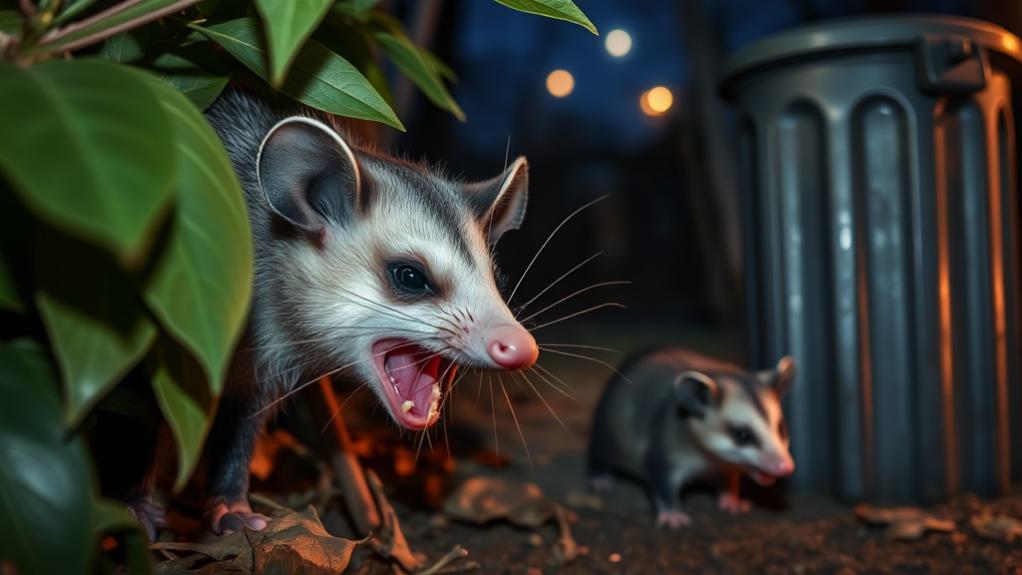
A stressed opossum can quickly shift from docile to defensive when faced with common environmental triggers. Let me tell you what sets these critters off – and trust me, you'll want to pay attention. Their nocturnal nature makes them especially sensitive to daytime disturbances, and they often retreat to den locations like hollow trees or brush piles when stressed.
First up: territorial disputes during foraging. When you've got multiple opossums fighting over the same midnight snack, things can get heated fast. Add some physical confinement to the mix, and you've got a recipe for defensive behaviors faster than you can say "playing possum."
Here's what really gets them worked up:
- Sudden loud noises (your midnight drum solo? Not appreciated)
- Bright lights (they're not fans of your impromptu photo shoots)
- Being cornered or trapped (wouldn't you get anxious?)
- Predators or threats getting too close
- Other opossums encroaching on their turf
*Pro tip: Give these stressed marsupials their space. Seriously.*
Creating Safe Encounters
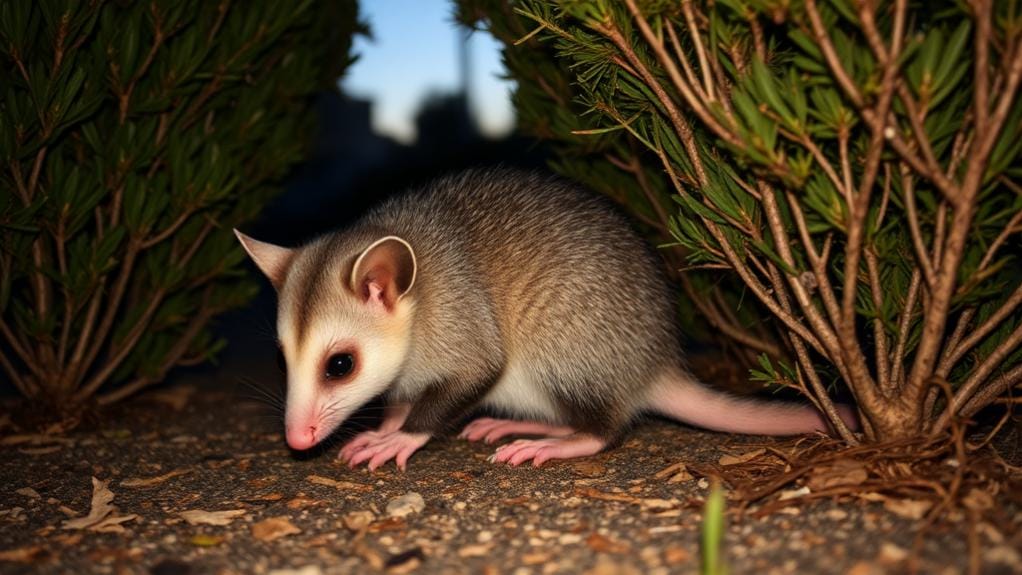
Now that you know what stresses opossums out, let's look at how to keep encounters peaceful and safe for everyone involved.
These misunderstood creatures aren't plotting world domination – they'd rather play dead than pick a fight! Using natural repellent options like garlic and chili powder can help keep them at a distance while respecting their space.
For peaceful encounters, remember these key points:
- Keep your cool when you spot one. Trust me, that hissing and growling is just their way of saying "I'm not having the best day!"
- Secure those food sources like your life depends on it – tight garbage lids and no pet food buffets outside.
- Give them a clear escape route if they wander inside. Don't corner them unless you want a very convincing "dead" possum performance.
Remember: coexistence is totally possible when you respect their space. These little guys are nature's cleanup crew, not your nemesis!
Distinguishing Between Fear and Aggression
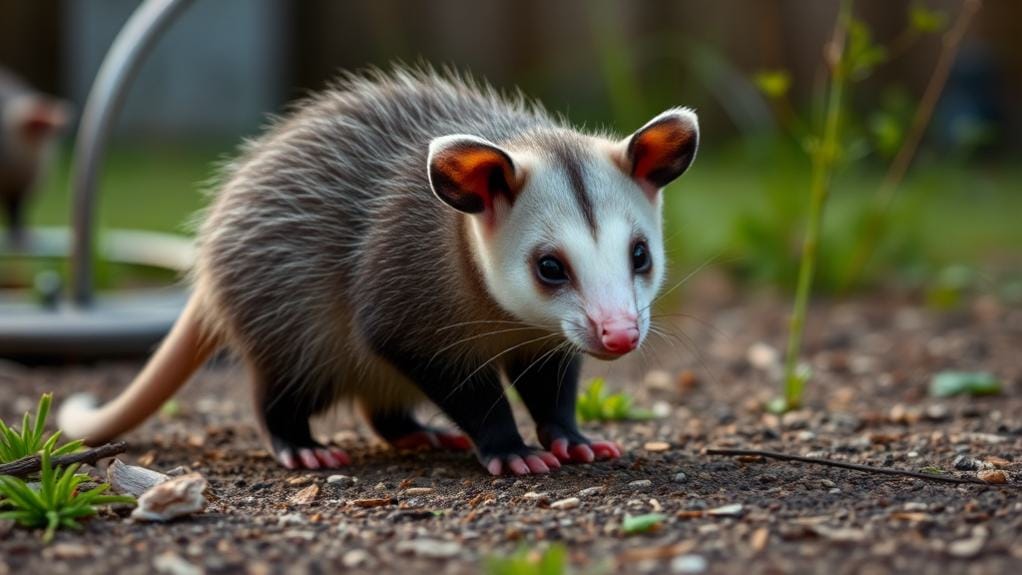
When encountering up against a seemingly aggressive opossum, it's crucial to recognize the difference between genuine aggression and fear-based defensive behaviors. Let me break down what's really happening when you think that opossum is out to get you.
While they may look threatening, disease concerns about opossums are often overblown compared to their actual peaceful nature. That hissing and growling? It's not the opossum equivalent of "let's fight." It's more like "please don't make me deal with you right now."
Trust me – these creatures would rather play dead than pick a fight. Their defensive behavior is all about self-preservation, not aggression.
Pro tip: If you see an opossum acting protective, especially around babies, just back off. They're showing their protective instinct, not planning your demise.
Understanding these misconceptions helps us see opossums for what they really are: non-aggressive creatures who'd rather avoid drama altogether.
Effective Communication With Opossums
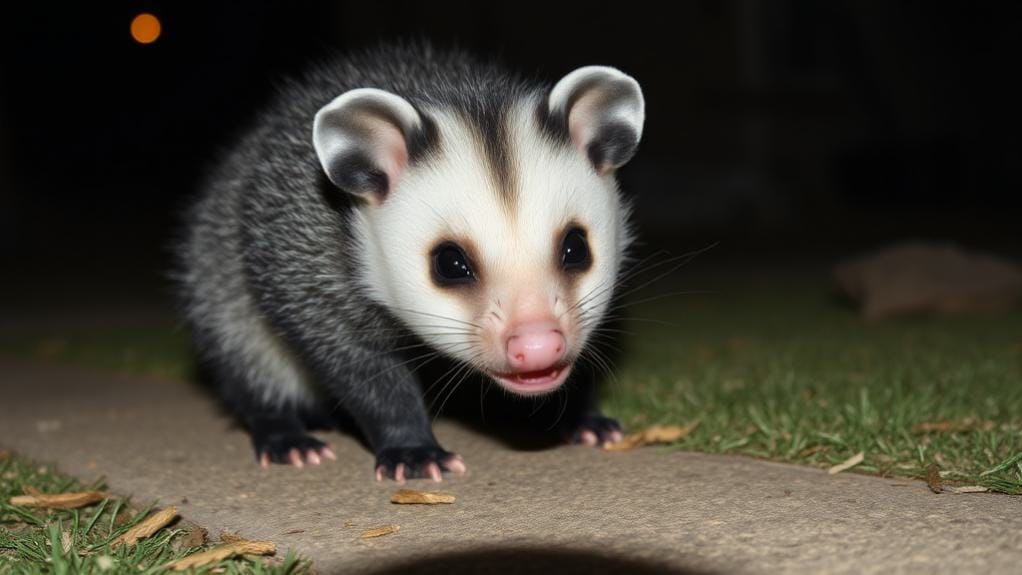
Through their diverse vocal repertoire, opossums speak volumes about their emotional state and intentions.
I'll help you decode their unique defensive communication so you can understand when they're feeling threatened or just excited about life. Trust me – it's not rocket science!
- Hissing and growling? Back off! These defensive sounds mean you're way too close for comfort. (And no, they're not trying to be your friend.)
- Clicking sounds might mean they're doing their best rattlesnake impression. Pretty clever way to scare off predators, right?
- Chattering usually signals excitement or reassurance, especially among family groups. It's basically opossum small talk.
Understanding these vocalizations helps you know when effective communication is happening.
If you hear hissing, give them space! If they're chattering, they're probably feeling safe. Simple as that.
Peaceful Coexistence Strategies
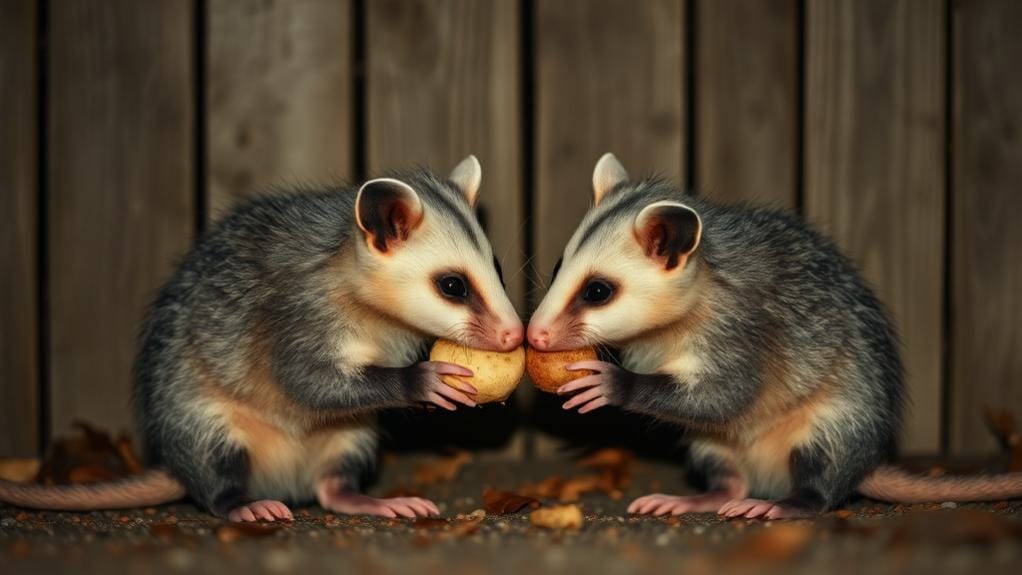
Living in harmony with opossums comes down to smart prevention and mutual respect. I'll show you how to create peaceful coexistence without turning your yard into an all-you-can-eat buffet for these nocturnal neighbors.
First, get serious about your garbage cans – tight lids aren't just a suggestion, they're your first line of defense. Trust me, you don't want these critters thinking your trash is their treasure.
Pro Tips for humane methods:
- Remove pet food at night (yes, even if Fluffy protests)
- Install motion lights (surprise party for possums!)
- Seal holes under decks (check for babies first)
- Clean up fallen fruit (less midnight snacking)
Here's the kicker – educate your neighbors about how opossums help with pest control. They're nature's cleanup crew!
When everyone understands their value, we reduce potential encounters and create a safe environment for all.
Frequently Asked Questions
What Do Possums Do When They Are Angry?
I'll tell you what angry possums do: they'll hiss, growl, and bare their teeth at threats. They'll also puff up their bodies, make rattlesnake-like clicking sounds, and might scratch or bite if cornered.
Why Would a Possum Be Aggressive?
I'll tell you why possums act aggressively: they're usually scared and defending themselves, protecting their babies, or feeling cornered. They're not naturally mean – they just want to feel safe like we do.
What Does It Mean When a Possum Hisses?
Like a scared cat raising its hackles, when I hear a possum hiss, I know it's feeling threatened. It's their way of saying "back off" – they're more frightened than fierce, just trying to protect themselves.
What Do Possums Do When They Feel Threatened?
I'll tell you what possums do when threatened: they'll often play dead by falling over and emitting a foul smell. They might also hiss or bare their teeth, but they'd rather avoid conflict.
Last Word
I've learned that opossums aren't the vicious creatures people think they are. In fact, studies show they only bite in 0.3% of encounters – your neighbor's chihuahua is way more likely to chomp you! If you're smart about giving them space and watching their body language, you'll find these misunderstood marsupials make great backyard neighbors. Just remember: they're playing dead to avoid you, not to entertain your Instagram followers.




